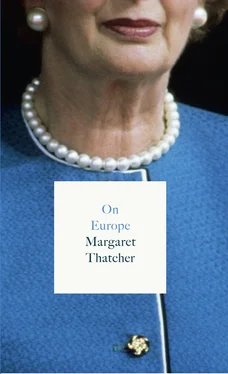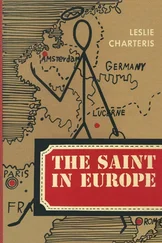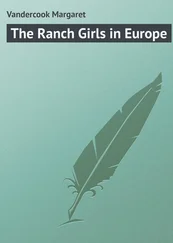WIDER STILL AND WIDER …
In such circumstances it might seem odd that the EU is besieged by countries seeking membership. The shortcomings of the system are, after all, there for all to see. Yet enlargement is still the topic most talked about in European circles – at least in public.
Thus the alleged rationale of the Nice Summit in December 2000 was to prepare for further enlargement of European Union membership. It was argued that increasing the number of member countries from fifteen to twenty-seven required institutional reforms which would allow more streamlined decision-making, i.e. loss of the national veto. 22One can see how that fits the federalist agenda. What is increasingly contestable, however, is the sincerity with which EU countries view enlargement.
During the 1980s and most of the 1990s, Britain was in the forefront of those urging a widening of Community membership. As Prime Minister, I was keen to see the former dictatorships of Spain and Portugal given the opportunities and the stability required for democracy to flourish. Both I, and later John Major, were even keener to widen membership to include the former communist countries of Central and Eastern Europe, for very much the same reason. The extension of the frontiers of a free and prosperous Europe to the east was an integral part of the programme of a Europe of cooperating nation states which I had put forward in my speech at Bruges in 1988 – where I reminded my audience that ‘we shall [for which read ‘should’] always look on Warsaw, Prague and Budapest as great European cities’. After the fall of the Berlin Wall the following year this argument became even more cogent. To prolong the division of Europe by an economic tariff wall once the old political wall dividing West and East had crumbled was manifestly unjust.
Yet this is precisely what the European Community did. Far from welcoming in the former communist countries – with the exception of East Germany, which joined the West with hardly a by-your-leave – they were left to the tender mercies of agricultural dumping under Europe’s CAP and a niggling system of trade quotas. Twelve years after the collapse of communism, Poland, Hungary, the Czech Republic and the rest are still waiting.
Enlargement of the Community eastwards has traditionally been attractive to both the British and the Germans, but has been a good deal less so to the French and to the countries of Southern Europe. There is no great secret as to why this is so. Alongside our wish to see the ex-communist countries encouraged to create successful Western-style economies, British governments have hoped that, as the EU jargon has it, ‘widening’ would be at the expense of ‘deepening’. With the prospect of enlargement to include as many as twenty-seven members – counting in all the candidate countries – it seemed to us a plain impossibility to proceed with creating a federal superstate. The differences and potential conflicts between the members would be just too great.
For the Germans, extension eastwards had a rather different attraction and reflected other geopolitical interests. As a revealing CDU/CSU paper, ‘Reflections on Europe’, of 1 September 1994, put it:
The only solution which will prevent a return to the unstable pre-war system, with Germany once again caught in the middle between East and West [a somewhat eccentric description of the Third Reich in the thirties!], is to integrate Germany’s Central and Eastern European neighbours into the European post-war system and to establish a wide-ranging partnership with Russia … If European integration were not to progress, Germany might be called upon, or be tempted by its own security constraints, to try to effect the stabilisation of Eastern Europe on its own and in the traditional way . [Emphasis added]
By contrast, the French have, with the limited exception of Romania, not sought out friends or clients in Eastern Europe. Moreover, France and even more so Greece, Spain and Portugal have been extremely wary of the impact upon the CAP, and the valuable benefits they receive from it, of the introduction of new members with large, primitive agricultural sectors.
For as long as the Germans continued to be enthusiastic about the entry of the ex-communist countries, some (albeit snail-paced) progress was made. But it is now apparent that resistance within Germany to expansion is growing. The German EU Commissioner for Enlargement, Günter Verheugen, has, for example, suggested that a referendum may be needed in Germany before enlargement goes ahead. German public opinion appears to be quite strongly opposed to the prospect of free entry for goods and services and, above all, workers from the East. In particular, hostility to early full membership for Poland has hardened. 23
The present British government is, it seems, still strongly in favour of early expansion. But one may question whether this policy still makes much sense. All that has been seen of developments within the European Union over the last decade confirms that ‘deepening’ – that is the persistent accumulation of more and more powers by European institutions to override national wishes and interests – will go ahead, however much membership ‘widens’. Indeed, as was shown by the decisions made at Nice, even the vague prospect of enlargement provides the excuse for a raft of new measures of centralisation. Similarly, the long-standing British hope that the need to absorb new members would lead to fundamental reform of the European Union’s finances, above all the CAP, shows every sign of proving illusory.
For all these reasons, I am now unpersuaded by the case for further EU expansion. And although I fully understand the mix of historical, political and economic factors which account for the enthusiasm of the Central and East European countries for full membership, I also doubt whether they are well-advised to press for it on the terms available. Since leaving office, I have had the benefit of many frank and friendly (and that in the proper not diplomatic sense) conversations with senior political figures from these countries. Most of them, when pushed, are uneasy about what the EU may entail. Having endured the best part of half a century living under socialist bureaucracy, and seeing their national identities and rights overridden, they are not at all keen to be ruled from Brussels. Furthermore, although many of them are deeply uneasy about instability to the east, and so still want the reassurance offered by EU (as well as NATO) membership, they have few illusions about the degree to which Europe is dominated by Germany. And that too worries them, though they are not likely to admit it publicly.
European politicians and officials are wont to talk rather patronisingly of how far the applicant countries have yet to go in modernising and opening up their economies in order to prepare for entry. But what really alarms the Europeans is their own lack of preparedness in the face of low-cost competition. If as part of their preparations for entry the former communist countries are willing to tie themselves up with all the rules and regulations imposed by Europe, they will finish up by giving away much of the competitive advantage they currently enjoy. At which point, presumably, their slower growth rates could be used in order to justify putting off membership once again. In my view, the applicant member countries would therefore be well-advised to consider long and hard whether full membership of the European Union is what they really want. Negotiating free-trade agreements with the EU and with the North American Free Trade Area (NAFTA) – and, indeed, with Britain (on which, see the next chapter) – might suit their interests better.
So I believe that:
The old arguments for expansion of EU membership no longer apply
Читать дальше












